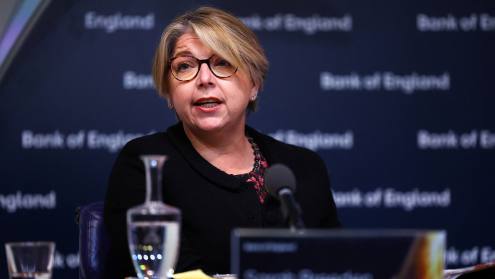Central banks need to remain vigilant and stick to their inflation targets, despite the challenging economic conditions they find themselves in, says Koba Gvenetadze, governor of the National Bank of Georgia (NBG).
“Generally, central bankers are in a very difficult situation these days,” says Mr Gvenetadze whose seven-year term as central bank governor ends on March 2.
Arguably, he may be leaving one of the most stressful jobs in banking at just the right time. Inflationary pressures might be easing slightly, but central banks are still grappling with the economic fallout from the war in Ukraine, and stubbornly high inflation.
With respect to the latter, Mr Gvenetadze says it is unfair to blame central banks for high inflation. “In 2020 when the world was facing this invisible threat and enemy, which was Covid-19, everything was about getting growth back. All the attention was on making sure that recovery came. By that time, nobody thought about the risk of inflation. Then inflation came.”
In Georgia, inflation peaked at 13.3% in May last year, according to Fitch Ratings, before easing to 9.8% in December, with core inflation of 6.8%, which is still well above the NBG target of 3%. Mr Gvenetadze says there have been some shock factors, which have contributed to inflation remaining above the central banks’ comfort zone. “That is why I think central banks should stay very firm. They should stay independent and committed to their inflation targets and implement as tough a decisions as possible,” he says.
Central bankers should not seek popularity
Central bank independence is more important than ever before, says Mr Gvenetadze, who warns against central bankers seeking popularity, by easing monetary policy too soon. “Important decisions will lag behind and won’t be implemented,” he says. “That is why popularity and good central bankers don’t go hand in hand. I would argue the opposite. Good central bankers are unpopular and in order to do that, the central bank should be independent.”
popularity and good central bankers don’t go hand in hand. I would argue the opposite
Mr Gvenetadze appears to have followed his own advice. On 30 March 2022, in response to the increased risk of high inflation and the war in Ukraine, the National Bank of Georgia hiked its refinancing rate to a 14-year-high of 11%, from which it has not budged since. Fitch Ratings predicts inflation will fall to 5.2% by the end of this year, but Mr Gvenetadze says the central bank needs to remain vigilant. “We have to maintain a tight monetary policy because we have so many surprises as do many central banks. So for example, in Georgia, we had an influx of migrants because of our geographical proximity to Russia, Belarus and Ukraine. Rent prices increased, which has contributed to higher inflation. We want to ensure monetary policy remains tight enough to ensure declining inflation is sustainable.” Fitch estimates that around 90,000 Russian and Belarusians migrated to Georgia in 2022, and money transfers surged by 86%.
Mr Gvenetadze says it might be possible to ease monetary policy in the second half of this year, but is reluctant to commit to an exact timeline. Ultimately, that decision will be up to his successor, who has not been named yet.
Financial education: A win-win for the financial system and borrowers
One of the reforms of which Mr Gvenetadze seems most proud of, during his seven-year stint as governor is the focus he placed on increasing financial literacy and education — what is budgeting, what is an interest rate, what is a nominal interest rate — among Georgian school students, start-ups, small-business owners, and retirees via a website the NBG launched called FinEdu.gov.ge. “It has become very popular and I’m really very proud of it,” the governor says.
He says the financial sector took advantage of borrowers who did not understand the terms and conditions under which loans were extended. “For example, [borrowers] didn’t know the difference between a nominal interest rate and effective interest rate, or triggers under which conditions of loans would be changed. The financial institution was under no obligation to give a draft agreement to borrowers. So, what we said is that you have to get a draft agreement before signing it.”
His efforts seems to have paid off as the number of borrower complaints skyrocketed, a result the governor says he is very happy with. “Borrowers saw that they have rights, and they can defend their rights. Financial literacy also contributes to financial stability as when you have borrowers who are well educated they are in a better position to repay loans and the risks for financial institutions and defaults or non-payments is reduced. So it is a win-win for the financial system and borrowers.”
But his biggest regret, he says, is that Georgia did not reach investment grade while he was still governor. In January, Fitch revised its outlook on Georgia’s long-term foreign-currency issuer default rating (IDR) to positive from stable and affirmed the IDR at BB. “I’m 99% sure if there hadn’t been the war [in Ukraine],” says Mr Gvenetadze, “Georgia would already have investment grading because all directions: inflation, current account deficit, dollarisation have been going in the right direction, but this unfortunate event stopped it.”
A longer interview with the National Bank of Georgia’s governor will be published in the April issue of The Banker.








